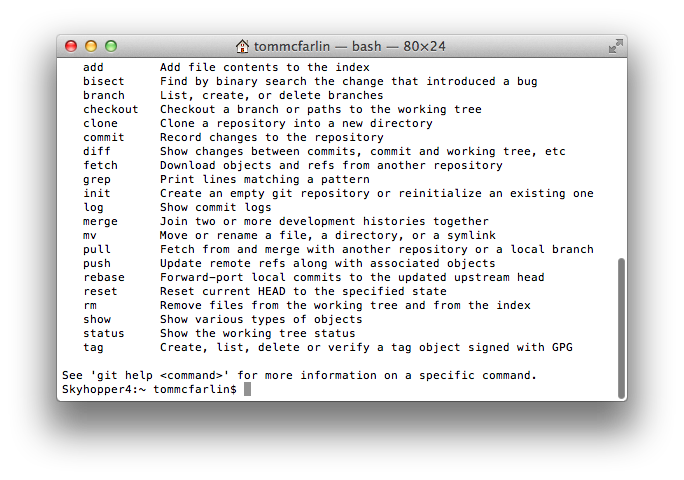Install Command Line For Git Mac
You can now easily install Git for use on the command line, without needing to. And whenever we update the version of Git included with GitHub for Mac, you'll. Both tools exists but are outdated. Git on yosemite is on version 1.9.3, homebrew version is 2.2.0. Anyway, you don't need to install Xcode, just need the command line developer tools, and you can install by typing xcode-select --install. – jherran Dec 13 '14 at 10:33.
At first, you have all the texts received and sent, with the recorded dialogues. Can you download the messages app for mac computer. He divides its content into three main tabs: messages, Favorites and Friends. If you prefer, you can create a user through the application itself.

Ubuntu 16+ Run the following from your terminal: $ sudo snap install --classic heroku. Other installation methods Standalone installation The standalone install is a simple tarball with a binary that is useful in scripted environments or where there is restricted access (non-sudo).
It contains its own node.js binary and will autoupdate like the above install methods. We encourage this method inside docker containers.
To quickly setup into /usr/local/lib/heroku and /usr/local/bin/heroku, run this script (script requires sudo and not Windows compatible): $ curl sh Otherwise, download one of the tarballs below and extract it yourself. Tarballs These are available in gz or xz compression. Xz is much smaller but gz is more compatible.
• • • • • Ubuntu / Debian apt-get $ curl sh This version does not autoupdate and must be updated manually via apt-get. Use the or for an autoupdating version of the CLI. Arch Linux is community maintained and not by Heroku. $ yay -S heroku-cli npm The CLI is built with Node.js and is installable via npm. This is a manual install method that can be used in environments where autoupdating is not ideal or where Heroku does not offer a prebuilt Node.js binary.
It’s strongly recommended to use one of the other installation methods if possible. This installation method does not autoupdate and requires you to use your system’s version of Node.js, which may be older than the version Heroku develops the CLI against. Heroku uses very current releases of Node.js and does not back-support older versions. If you use any of the other installation methods the proper version of Node.js is already included, and it doesn’t conflict with any other version on your system. Also, this method won’t use the yarn lockfile for dependencies like the others do (even if you install with yarn). This may cause issues if the CLI’s dependencies become incompatible in minor or patch releases. This installation method is required for users on ARM and BSD.
You must have node and npm installed already. $ npm install -g heroku Verifying your installation To verify your CLI installation, use the heroku --version command: $ heroku --version heroku/7.0.0 (darwin-x64) node-v8.0.0 You should see heroku/x.y.z in the output. If you don’t, but you have installed the Heroku CLI, it’s possible you have an old heroku gem on your system. Uninstall it with. Getting started After you install the CLI, run the heroku login command. You’ll be prompted to enter any key to go to your web browser to complete login. The CLI will then log you in automatically.

$ heroku login heroku: Press any key to open up the browser to login or q to exit › Warning: If browser does not open, visit › heroku: Waiting for login. Done Logged in as me@example.com If you’d prefer to stay in the CLI to enter your credentials, you may run heroku login -i $ heroku login -i heroku: Enter your login credentials Email: me@example.com Password: *************** Two-factor code: ******** Logged in as me@heroku.com The CLI saves your email address and an API token to ~/.netrc for future use. For more information, see. Now you’re ready to create your first Heroku app: $ cd ~/myapp $ heroku create Creating app. Done, ⬢ sleepy-meadow-81798 Check out your preferred language’s for a comprehensive introduction to deploying your first app. Staying up to date The Heroku CLI keeps itself and its plugins (except linked plugins) up to date automatically, unless you installed the Debian/Ubuntu package or used npm install.
When you run a heroku command, a background process checks for the latest available version of the CLI. If a new version is found, it’s downloaded and stored in ~/.local/share/heroku/client. This background check happens at most once every 4 hours. The heroku binary checks for an up-to-date client in ~/.local/share/heroku/client before using the originally installed client.